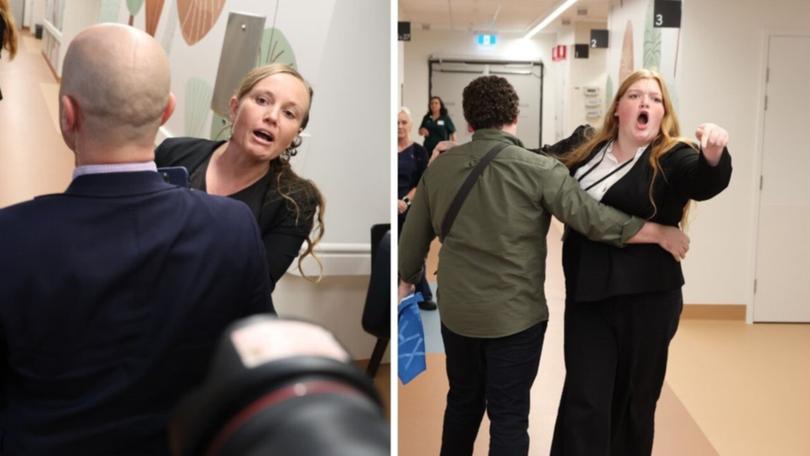Australian news and politics recap April 3: Anthony Albanese falls off stage on campaign trail in NSW
RECAP: Prime Minister Anthony Albanese has taken an unfortunate tumble onstage while posing for photos on the campaign trail.
Scroll down for the latest news and updates.
Key events
03 Apr 2025 - 02:35 PM
Dutton announces $16.2m package to upgrade Busselton airport
03 Apr 2025 - 12:49 PM
Anthony Albanese tumbles onstage on campaign trail
03 Apr 2025 - 12:26 PM
Albo promotes ‘same job, same pay’ policy
03 Apr 2025 - 12:18 PM
Tariffs may accelerate rate cuts
03 Apr 2025 - 12:17 PM
Peter Dutton speaks at Midland mining company
03 Apr 2025 - 11:22 AM
Trump tariff maths ‘dumb’: Economists
03 Apr 2025 - 11:19 AM
Two climate protesters crash Albo’s media conference
03 Apr 2025 - 11:02 AM
Not all products get a tariff: Here are the carve-outs
03 Apr 2025 - 10:24 AM
Keating says Trump’s tariffs are the ‘death-knell of NATO’
03 Apr 2025 - 10:03 AM
Albo calls out Trump imposing tariff on tiny island
03 Apr 2025 - 09:48 AM
Hancock boss hits out at ‘whingeing and moaning’ over tariffs
03 Apr 2025 - 09:35 AM
Date for second leaders’ debate confirmed
03 Apr 2025 - 09:31 AM
PM confirms Aussie beef won’t be banned
03 Apr 2025 - 09:17 AM
Dutton holds line in fiery press conference
03 Apr 2025 - 08:59 AM
Dutton grilled on critical minerals
03 Apr 2025 - 08:56 AM
Dutton: ‘The deal is there to be done’
03 Apr 2025 - 08:52 AM
Dutton: News media bargaining and social media age limit non-negotiable
03 Apr 2025 - 08:48 AM
Dutton: I could have achieved a different outcome
03 Apr 2025 - 08:44 AM
Dutton: I will stand up and fight for Australia
03 Apr 2025 - 08:40 AM
Dutton: Albo not up to building successful relationship with Trump
03 Apr 2025 - 08:37 AM
Dutton slams PM for not speaking to Trump
03 Apr 2025 - 08:32 AM
‘Bad day’: Peter Dutton responds to tariffs
03 Apr 2025 - 07:56 AM
Investors bolt as Trump tariffs drops a bomb on ASX200
03 Apr 2025 - 07:23 AM
Albanese backs Australia’s pharmaceuticals subsidy scheme
03 Apr 2025 - 07:21 AM
Greens call for Australian ‘Liberation Day’
03 Apr 2025 - 07:19 AM
No beef ban, senior government sources say
03 Apr 2025 - 06:45 AM
Dutton slam’s Albo-Rudd-Trump ‘dysfunctional relationship’
03 Apr 2025 - 06:36 AM
US tariffs threaten global economic stability, Prime Minister warns
03 Apr 2025 - 06:31 AM
PM announces five-point response plan to US tariffs on Australia
03 Apr 2025 - 06:03 AM
PM says US won’t bully Australia on social media regulation
03 Apr 2025 - 06:00 AM
Ai Group warns of “ominous signal” for economic future
03 Apr 2025 - 06:00 AM
Farmers warn biosecurity must not be undermined
03 Apr 2025 - 05:59 AM
Trade Minister to meet with European counterpart to explore reopening trade links
03 Apr 2025 - 05:45 AM
Big business ‘deeply disappointed’ by Trump tariffs
03 Apr 2025 - 05:25 AM
Anthony Albanese responds to Donald Trump’s tariffs
03 Apr 2025 - 05:19 AM
Donald Trump’s ‘Liberation Day’ tariffs explained
03 Apr 2025 - 05:17 AM
Nationals Farmers’ Federation respond to Trump tariff
03 Apr 2025 - 04:55 AM
Australia hit with ‘baseline’ tariff
03 Apr 2025 - 04:50 AM
EU scores discounted tariff rate
03 Apr 2025 - 04:48 AM
Not all tariffs reciprocal: China scores Trump discount
03 Apr 2025 - 04:41 AM
Donald Trump unveils tariff board
03 Apr 2025 - 04:36 AM
Australia’s tariff rate revealed
03 Apr 2025 - 04:31 AM
‘Starting tomorrow’: Tariffs announced
03 Apr 2025 - 04:22 AM
Trump calls out Australian beef in tariff announcement
03 Apr 2025 - 04:18 AM
Trump hits out at other countries
03 Apr 2025 - 04:15 AM
‘We are going to come back very strongly’
03 Apr 2025 - 04:14 AM
‘Declaration of economic independence’
03 Apr 2025 - 04:11 AM
Tariffs revealed: Trump to sign executive order to implement reciprocal tariffs
03 Apr 2025 - 04:09 AM
‘We have some very good news today’
03 Apr 2025 - 04:07 AM
Trump arrives with MAGA hat
03 Apr 2025 - 04:05 AM
JD Vance arrives for tariff announcment
03 Apr 2025 - 04:01 AM
Trump about to make tariff announcement
03 Apr 2025 - 03:49 AM
Beer and aluminium cans to be hit with tariffs
03 Apr 2025 - 03:47 AM
Before Trump makes his announcement, what is a tariff?
03 Apr 2025 - 03:44 AM
White House issues first article on ‘Liberation Day’ tariffs
03 Apr 2025 - 03:25 AM
‘Nobody knows the details’: Trump’s secret plan
03 Apr 2025 - 03:20 AM
World waits as Trump set to announce US tariffs
03 Apr 2025 - 03:03 AM
Welcome to Donald Trump’s ‘Liberation Day’
Thanks for following
This concludes our live news and politics coverage for the day.
Join us tomorrow for more updates from the Federal election campaign trail.
Enjoy your evening!
Dutton announces $16.2m package to upgrade Busselton airport
Peter Dutton has announced a $16.2m package to upgrade the Busselton airport, in the electorate of Forrest.
MP Nola Marino is retiring, and former senator Ben Small is running to replace her. But he’s under threat from a local independent, Sue Chapman.
The total cost of the airport redevelopment is $65m. The Opposition Leader says the investment will boost local economic growth and ensure the long-term sustainability of regional aviation.
“Now, more than ever, we must invest in productivity-enhancing infrastructure that supports regional communities,” he said.
“Regional airports are economic lifelines—they drive tourism, create jobs, and ensure communities stay connected to essential services like healthcare, freight, and business opportunities.”
Anthony Albanese tumbles onstage on campaign trail
Prime Minister Anthony Albanese has taken an unfortunate tumble onstage while posing for photos on the campaign trail.
Mr Albanese was delivering a speech at an event in Lovedale, NSW, in the Hunter region when he slipped from the platform.
He was quickly helped back to his feet before he waved to the crowd suggesting he was OK, laughing off the embarrassing situation.
The incident came after Mr Albanese was heckled by climate protesters. Read more here.
Watch it here:
Albo promotes ‘same job, same pay’ policy
Prime Minister Anthony Albanese has spoken to the Mining and Energy Union in the electorate of Hunter to promote Labor’s “same job, same pay” policy.
New research by a Labor-aligned think tank, the McKell Institute, claims this framework, introduced in 2023 as an amendment to the Fair Work Act, has driven significant gains in wages across the country.
It aimed to close the “labour hire loophole” to allow labour hire workers engaged by a host company to get the same pay as that company’s own employees.
“These are new laws, responding to a new challenge,” said Mr Albanese.
“But at their heart is a principle as old as the labour movement itself – a fair day’s pay for a fair day’s work.”
He said the new report confirmed the scale of this problem was bigger than anyone imagined and that the benefits of the solution have exceeded all expectations.
“This year alone, they are estimating a fair-go dividend of nearly one billion dollars,” he said.
“And then there is the multiplier effect: a $2.5 billion flow-on economic benefit to communities, especially regional communities.”
Labor has previously warned that Opposition Leader Peter Dutton would repeal the law.
However, Mr Dutton confirmed on Thursday that he will not overturn Labor’s industrial relations laws if he comes to government.
Tariffs may accelerate rate cuts
Ecomomists have been running the sums on what Trump’s tariffs will mean for the RBA’s next rate decision.
RBC Capital Markets economist Su-Lin Ong said there were “mounting risks to global growth” which run counter to the view of the RBA in keeping rates on hold this week at 4.1 per cent.
“Today’s global developments perhaps argue the opposite” to the RBA’s “cautious tone” Ms Ong said.
Christian Baylis, chief investment officer of Fortlake Asset Management, and a former RBA economist said the diversion of goods away from America might lead to prices declining here.
“If it’s a structural drop, you’re going to have a lot of TVs, a lot of cars and a lot of things trying to find a home pretty quickly. That would potentially push prices down, for sure, because you’re just gonna have excess supply versus demand,” he said.
NAB’s Alan Oster, said NAB is contuining to forecast a rate cut in May and further cuts to bring the official rate down to 3 per cent early next year. “The RBA will just watch the data, especially with so much uncertainty,” he said.
Peter Dutton speaks at Midland mining company
Peter Dutton held a second short press conference at a mining equipment company in Midland, in the seat of Hasluck, flanked by Nationals candidate for Bullwinkel Mia Davies and senior WA Liberal Michaelia Cash.
He announced the Coalition would restore the $100 million junior minerals exploration incentive, which gives tax credits to companies looking for minerals.
He spruiked the $600 million agriculture and mining roads fund, which is a national pool of money although the Coalition says WA will be a major beneficiary.
“There’s so much that relies on the success of the WA economy. It is an entrepreneurial spirit here alive in WA and we want to make sure that we can expand that,” Mr Dutton says.
He also spoke about the lengthy approval process for the Woodside’s North West Shelf gas export facility expansion, which took six years for the State government to approve and has been delayed at the federal level by environmental groups filing protests.
Mr Dutton’s message to everyone in or connected to the mining sector in WA they they won’t be able to trust a minority Labor government reliant on the Greens support.
Trump tariff maths ‘dumb’: Economists
Over on X, people have been trying to work out how each country’s individual tariffs have been caculated.
Despite waving a 400 page list of trade grievances on the Rose Garden lawn, it appears no-one at the White House has bothered doing any actual economic modelling of where the “recirprocity” lies.
Instead, the rate of tariff seems to be calculated mechanically.
The administration has taken the figure for the US trade deficit in goods with a country, divided by the imports from that country, then halves it.
Amercia, for example has a $US17.9 billion trade deficit with Indonesia. Indonesia’s exports to us are $US28 billion.
$17.9/$28 = 64 per cent, which means Indonesia’s tariffs are 32 per cent.
If America has a trade surplus with a country, such as Australia, the tariff is 10 per cent.
Economist Chris Richardson writing on LinkedIn said;
“It’s hard to describe just how dumb that mechanical formula is, let alone how dumb the impact of all this will be
I’m in Vietnam, which was just hit with a 46% tariff. Small business people are reeling, and emotions are starting to rise
It’s all so astoundingly pointless. 😞”
Albo labels Trump’s decision on Norfolk Island tariffs ‘a rather strange one’
Anthony Albanese called the decision for Donald Trump to impose tariffs on Norfolk Island “a rather strange one”.
“It is of course is a part of Australia.”
“I’m not sure that Norfolk Island with respect to it is a threat to the United States economy and therefore I think it being singled out is rather strange,” he said.
“We will seek an explanation but I’ve got to say the global impact of what has been announced today I don’t think Norfolk Island is front and centre.”
Two climate protesters crash Albo’s media conference

Two climate protesters have crashed the Prime Minister’s media conference at Maitland hospital on the NSW central coast.
“Mr Albanese, why did your government approve 33 new fossil fuel projects,” one protester yelled while the Prime Minister was mid speech.
“It’s my future, it has to stop.”
Watch what happened:
Not all products get a tariff: Here are the carve-outs
As President Donald Trump’s sweeping new tariff regime begins to take effect, a select group of goods has been carved out of the trade crackdown.
While most imports face a flat 10 per cent tariff from April 5 — and steeper country-specific rates from April 9 — the executive order outlines key exemptions.
Pharmaceuticals, semiconductors, copper, lumber, energy products, and certain critical minerals are all excluded under Annex II. Automobiles and auto parts already covered by separate national security tariffs are also spared.
Products with at least 20 per cent US-origin content will only be taxed on the foreign portion of their value, an incentive to shift production onshore.
Goods from Canada and Mexico that qualify under the United States–Mexico–Canada Agreement retain duty-free access, but non-qualifying imports face tariffs of 25 per cent — or 10 per cent for Canadian energy and potash.
The popular de minimis threshold for low-value imports remains — for now — but is expected to close once systems are in place to collect duties.
Steel and aluminium tariffs remain governed by prior orders and are unaffected by the latest executive action.
While these exemptions offer some relief, trade experts warn the broader plan still threatens major disruption to global supply chains.


